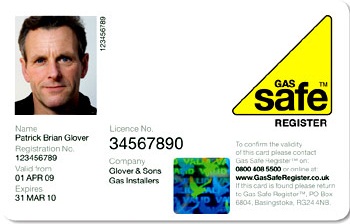
It wouldn't be right to support Gas Safety Week without taking some time to talk about who set up the campaign - The Gas Safe Register. If you've been reading our posts you'll already know that joining the Gas Safe Register is a legal requirement of all gas engineers if they want to work on gas installations and appliances in the UK, but what else do you know about them?
The Gas Safe Register is the official gas registration body for the United Kingdom, Isle of Man and Guernsey and was appointed by the relevant Health and Safety Authority for each area. It replaced CORGI as the gas registration body in Great Britain and Isle of Man on the 1st April 2009 and Northern Ireland and Guernsey on the same date the following year.
The main focus of the Gas Safe Register is improving and maintaining gas safety to the highest standards, however its utmost priority is keeping you and your family safe. Their team make sure all gas engineers on the Register (totalling over 125,000) are fully qualified to work with gas. It works to protect the public from unsafe gas work through a number of different means, including;
- A dedicated national investigations team tracking down individuals working illegally
- Regular inspections of Gas Safe registered engineers
- Educating consumers and raising awareness of gas safety
- Investigating reports of unsafe gas work
The Gas Safe Register highly advise that you always find an engineer that is part of the register. You can check this by asking to see their Gas Safe ID card, which will contain a unique license number. The front of the card will also display these important details:
- The engineer's photo
- The start and expiry dates
- A security hologram
- That engineer is from the business you employed
Meanwhile, the back of the card will also have printed on it whether that engineer is qualified to do the work you've hired him for and whether these qualifications are up to date. Should that fail, you can also check online or phone the Register on 0800 408 5500. This number is also the one to call if you suspect a fraudulent gas engineer.
How do I apply for a Gas Safe ID card?
First, you need to submit the name, address, phone number and trading title of your business to the Gas Safe Register. Then, you'll need to provide your National Insurance number and the National Insurance numbers of any engineers working for you. Once you've paid for your Gas Safe Id card, and the necessary checks have been done, it will be sent out to you.
What are the Gas Safe ID card categories?
Depending on what level of qualification you have, your Gas Safe Id card will show one of two categories, domestic or commercial work. This indicates the type of work that you're qualified to do. If you've got a gas engineer attending your property, but you're not sure if they're qualified for the domestic or commercial work at hand, you can ask to see their Gas Safe ID card to check this.
Can the gas safe register review gas work?
If you feel that gas work carried out at your home is unsafe, you can raise your concerns with the Gas Safe Register directly. They will record the problem and can even arrange an investigation of the problem. Once the investigation has been done, a report can be sent to you and your gas engineer so that any problems can be dealt with appropriately.
If you're unsure how to find a Gas Safe Registered engineer in your area, you can also contact the Gas Safe Register for their recommendations. They can highlight gas engineers and professionals in your local area that may be able to carry out a service for you.
So there you have it, a little bit more about the Gas Safe Register and what it does. If you need gas work done always be sure to check your engineer is registered, and if you're a register remember that being part of it is a legal requirement!
To mark Gas Safety Week, Access Training are offering 20% off our professional gas course from now until the end of September. To take advantage of this offer all you need to do is quote "GASWEEK" when speaking to one of our course advisors. You can contact them on 0800 345 7492.